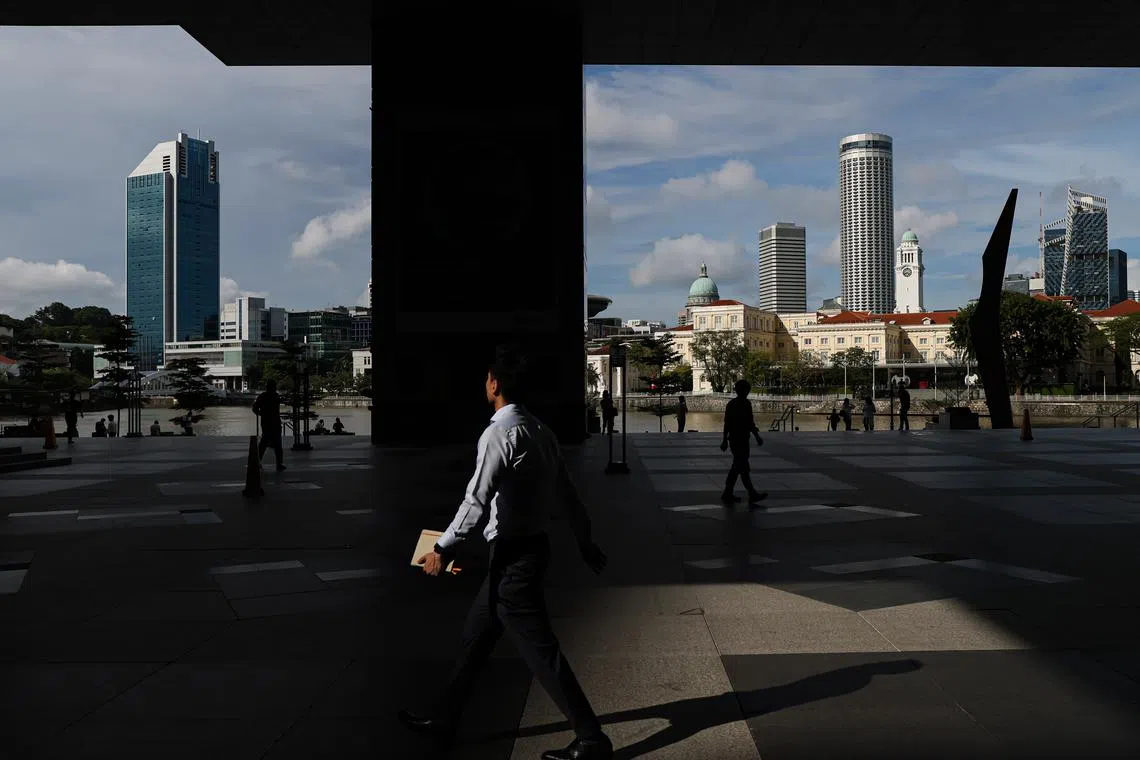4 things to take away from the last day of the Budget debate
Sign up now: Get ST's newsletters delivered to your inbox

Singapore needs to be prepared for tougher competition and do what it can to stay in the game despite the changing global system, PM Lawrence Wong said.
PHOTO: BT FILE
Follow topic:
SINGAPORE – Prime Minister Lawrence Wong set in context Budget 2025’s place among recent past Budgets and future needs in an hour-long speech to round up the 2½-day Budget debate on Feb 28.
Here is what he said in his speech and subsequent exchanges with MPs:
Supporting workers and firms in stiffening competition
Singapore needs to be prepared for tougher competition and do what it can to stay in the game despite the changing global system, PM Wong said.
He noted that countries are turning towards zero-sum competition rather than win-win cooperation, disadvantaging small, open economies like Singapore.
Acknowledging that several MPs had raised concerns over the high cost of doing business, PM Wong said the Government will keep an eye on cost competitiveness.
He also urged retailers in particular to adapt and rethink their business models, giving the example of baking supplies firm Phoon Huat, which grew its manufacturing and distribution capabilities, and adopted e-commerce, which lets it sell to customers internationally.
But Singapore cannot compete on cost alone to attract multinational firms, which have options, to set up shop here, PM Wong said in a subsequent exchange with Nominated MP Neil Parekh.
“We have to improve our capabilities, offer a value proposition to them, and that’s why we are investing in R&D (research and development),” he said.
The Government is also building up the capability of Singaporean workers and local businesses, in order to supply multinationals with the talent and products they need to keep long-term investments here.
In response to MPs who had raised concerns about livelihoods being disrupted by technological advances, PM Wong said these investments in local capabilities are part of the solution.
He assured Singaporeans that they will get support to adapt to economic changes, with more money to be devoted to training and workforce policies in the coming years, including under the SkillsFuture umbrella.
In another exchange, Non-Constituency MP Hazel Poa of the Progress Singapore Party (PSP) asked if more investment options could be made available for workers’ Central Provident Fund (CPF) savings, with differentiated rules based on age, so older workers can make only lower-risk investments.
On this, PM Wong said there are life-cycle funds available on the market with portfolios that adjust based on investors’ age, but these tend to not be very popular among Singaporeans. “(We) hope that we can make them more accessible to Singaporeans.”
He added that the Government is studying whether the CPF system can be redesigned or updated, but cautioned that even life-cycle funds may not consistently achieve better returns than current CPF rates of up to 6 per cent.
Keeping housing prices in check
Resale prices for Housing Board flats have gone up in the short term, but the Government is confident that flat prices will remain affordable in the longer term,
“Why? Because only Singaporeans can buy HDB flats, and we can – and we will – build enough housing for every Singaporean household,” he added.
PM Wong pushed back against a call by PSP’s Ms Poa to exclude land costs from the pricing of new flats, saying this would detract from the proper pricing of resources.
“It’s simply about getting our policies right and doing things the right way. If we don’t price properly, then we are giving a hidden subsidy,” he said, adding that this subsidy would have to be borne by consumers or taxpayers at some point.
Instead, the HDB pays the market price for the land cost of developing a new flat, but does not turn a profit for that flat, which is priced with affordability in mind, he said.
He gave the example of how a four-room Build-To-Order (BTO) flat in Sengkang in the October 2024 launch exercise
“So resale prices have gone up a lot. BTO, yes, but not as much, and in line with median incomes,” PM Wong said. “The difference is a subsidy that’s borne by the Government that, together with the higher cost of construction, is one of the key reasons why HDB’s deficit has increased sharply.”
HDB’s deficit was $2 billion in the 2018 financial year, but $6.8 billion in the 2023 financial year,
Covering this deficit will not be sustainable if overall property prices keep rising faster than incomes and the financing gap keeps growing year after year, he said.
However, cooling measures such as increases to additional buyer’s stamp duty for foreigners and those owning multiple properties, plus increased BTO flat supply, will help stabilise the market and ensure the deficit remains sustainable, he said.
“Overall, in the longer term, we are confident that HDB prices will remain affordable,” PM Wong said.
PSP Non-Constituency MP Leong Mun Wai then asked if the Government had a solution for HDB lease decay, where a flat’s value erodes towards the end of its 99-year lease, to which PM Wong said the Government’s solution is the Voluntary Early Redevelopment Scheme.
GST hike happened at the right time
The two-step goods and services (GST) hike in 2023 and 2024 did not “turbocharge” inflation,
Citing the continued decline in inflation from 2022 to 2024, he noted that the Monetary Authority of Singapore (MAS) had correctly assessed the impact of the hike to be transitory.
But the Prime Minister acknowledged that people are still concerned about cost pressures even though inflation has eased.
“It’s not unique to us. It’s felt across many other advanced economies where the headline economic indicators are positive but sentiments are poor,” he said, adding that people are still adjusting to new price levels stemming from past inflation.
PM Wong reiterated that the Government will provide temporary cost-of-living support for as long as it is needed and within means – for instance, through CDC vouchers.
The cost-of-living measures and the SG60 package
PM Wong also said inflation in Singapore in recent years was driven mainly by global factors, which had begun pushing prices up before the GST hikes.
In response, Mr Singh said the “turbocharging” effect was seen in how the GST hike contributed to core inflation.
He noted that the MAS had projected core inflation for 2024 to come in at 2.5 per cent to 3.5 per cent, with the GST increase contributing slightly less than 1 percentage point to those figures. This would mean the tax hike could have contributed as much as 40 per cent to core inflation, he said.
PM Wong disagreed. He said Mr Singh’s view would suggest that GST should be raised at a time of very high inflation, so that the proportionate impact of the change on inflation would be smaller.
What a bumper surplus means
If not for the GST increase and unexpectedly large corporate income tax collections, Singapore would have run a Budget deficit in both the 2024 and 2025 financial years, PM Wong said.
It would have found itself in a much weaker position, with less money available to spend on essential services, support for the needy and investments for the future, he added. He noted that the Government had also rolled out the Assurance Package
Responding to a question from Mr Liang Eng Hwa (Bukit Panjang), PM Wong also said that more than $40 billion is expected to be spent on social development by 2030, including moves tied to the Forward Singapore exercise.
Meanwhile, Mr Singh asked if the Government would update its medium-term fiscal outlook to include corporate income tax revenues that would accrue due to the Base Erosion and Profit Shifting (Beps) 2.0 initiative. This global scheme is aimed at tackling tax avoidance by multinational enterprises.
PM Wong noted that under Beps, a minimum corporate tax of 15 per cent across all countries has emerged. But competition between countries to draw investors via other incentives remains, he said.
“So even if the domestic top-up tax yields more revenue, we are very likely to have to also spend more to maintain our competitiveness,” he added.
Opposition MPs had, over the past two days of the Budget debate, also questioned the Government’s fiscal marksmanship because of the larger-than-expected surplus.
In reply, PM Wong said: “We have to make assumptions, and we have to decide how we deal with uncertainties. In a crisis when there is greater volatility in the economy, it is inherently more difficult to predict the turning points.”
In most other countries, poor budget marksmanship is when a government severely overestimates the revenue it will collect and underestimates its expenditure, he said.
PM Wong said this is not the case in Singapore, where surpluses are never squandered. Instead, they fund future needs and support Singaporeans, with the fruits of progress shared with everyone.


